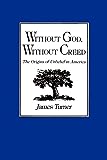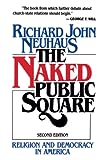Books Reviewed
When President Reagan spoke in religious terms to the National Association of Evangelicals in 1983, his remarks, particularly his description of the Soviet Union as the focus of evil in the world, incited a riot of comment. For example, in a New York Times column entitled “Onward, Christian Soldiers,” Anthony Lewis ridiculed Reagan, calling him “primitive.” “If there is anything that should be illegitimate in the American system,” wrote Lewis, “it is such use of sectarian religiosity to sell a political program.” Lewis concluded by implying that Reagan had done something unprecedented in our political life.
Apparently, Lewis has forgotten that at the nominating convention of the Progressive Party in 1912, all those present sang “Onward, Christian Soldiers.” In the ejection, the party’s candidate, Theodore Roosevelt, came in second to his Democratic opponent, Woodrow Wilson, but not because Wilson stood for the separation of religion and politics. In a speech in Denver in 1911, Wilson declared, “America was born a Christian nation. America was born to exemplify that devotion to the elements of righteousness which are derived from the revelations of Holy Scripture.” In 1918, as President, Wilson declared May 30 a day of national humiliation, prayer, and fasting. From the beginnings of the republic, Americans have mixed religion and politics. Even such a representative of the Enlightenment as Thomas Jefferson once proposed that our national seal depict Moses leading the chosen people to the Promised Land.
Traditionally, the Biblical Theism, with an admixture of moral philosophy, has provided coherence to American pluralism, countering the centrifugal tendencies of self-interest. On July 4, 1869, Henry Ward Beecher, who served as minister to a congregation of middle-class businessmen in New York City, preached a sermon entitled “The Moral Theory of Civil Liberty.” In this sermon, Beecher praised freedom and wealth but only if they led men away from their animal passions toward their higher sentiments, a Christ-like benevolence and, preeminently, the intellectual life that leisure made possible. Both the title of his sermon and the occasion of its delivery express nicely the way in which our national life stood upon a common ground of moral philosophy, theism, and Biblical ethics. Even those differences that went beyond what we normally encompass in the phrase “pluralism” remained upon this ground. Both sides in the Civil War, said Lincoln, “read the same Bible and pray to the same God.”
Our Biblical and moral tradition comprised a variety of denominations, theologies, and sects. John Quincy Adams was a member of this tradition, combining philosophy and Scripture in an elegant understanding of man’s privileged place in the universe, poised in that middle state between God and the beasts. So were the thousands who gathered at Cane Ridge, Kentucky, on August 6, 1801, in the first great camp meeting revival, jerking and grunting in ecstatic communion with their God. This tradition eventually came to include Roman Catholicism and Judaism, each making its own peace with the land of religious liberty. If some of the inhabitants of this land yet harbor suspicions of others, if some purity of dogma was lost, some practices made to accommodate changing times, some church structures bent by the forces of democracy, the result was still a blessing for America. We have benefited beyond measure both by our separation of church and state and by our blending of religion and politics.
In mixing religion and politics, then, Reagan has done nothing unprecedented. He has merely returned to a traditional American way of doing things. The animus generated by this return comes from fear of the goals pursued by Reagan’s religious allies and the accurate perception that a majority of Americans share the old, sturdy virtues they champion—belief in God, love of country, and pride in work. A recent survey found that 95 percent of Americans polled said that they believed in God, while 76 percent of the British, 62 percent of the French, and 79 percent of the Japanese said they did. Again, 71 percent of the Americans believed in an afterlife, while 43 percent of the Europeans and 31 percent of the Japanese did. (It is interesting to note that exactly the same percentages in each case said they were willing to die for their country.) The same poll found that 84 percent of the Americans took a great deal of pride in their work, while 36 percent of the Europeans and 37 percent of the Japanese did. Finally, 80 percent of the Americans said they were very proud to be American, while only 30 percent of the Japanese, 21 percent of the West Germans, 33 percent of the French, 55 percent of the British, and 41 percent of the Italians expressed great pride in their countries. Even more striking, in 1982 a Gallup poll found that 44 percent of Americans (25 percent of whom were college graduates) agreed with the statement that “God created man pretty much in his present form at one time within the last 10,000 years.” Only 9 percent of those who responded agreed with the statement that God had no part in human development.
The rhetoric of the religious right thus resonates in the souls of many Americans, including those who may not share the same religious sentiments as the conservative Christians or even agree with them on particular issues such as abortion or prayer in school. This suggests that a potent political force may develop. The religious right has reportedly gained significant grass-roots power in the Republican parties of Minnesota, Virginia, and several other states. With the money and support of conservative Political Action Groups and groups such as Moral Majority, Reagan’s return to our tradition of religion and politics may portend a significant change in our political life.
James Turner’s Without God, Without Creed and Richard John Neuhaus’s The Naked Public Square help us understand our current political-religious situation. Turner describes in detail the development of unbelief in the Western world, concentrating on nineteenth-century America. He argues that “it was religion, not science or social change, that gave birth to unbelief. Having made God more and more like man—intellectually, morally, emotionally—the shapers of religion made it feasible to abandon God, to believe simply in man” (p. 261).
Turner is describing the rise of liberal religion and its transformation into ethical culture. In our day, ethical culture has become, in a pejorative phrase, “secular humanism,” defined by Jerry Falwell “as the attempt to solve [man’s] problems independently of God.” By explaining the decline in God’s prestige, Turner makes more intelligible and plausible the reaction to religious liberalism, one version of which is the religious conservatism that has again become politically active in the United States.
One problem in Turner’s argument, however, is that he understates the aggressively secular character of the modern teachings, to which religion accommodated itself. He thus encourages his readers to underestimate the gulf that divides the religious right from their liberal antagonists. Members of the religious right have never done this. For example, at the Baptist Preconference Convention of 1920, A. C. Dixon described in unforgiving terms the character of his enemies. According to Dixon, the atheistic teachings of Darwin and Nietzsche led to the conclusion that might makes right, that the strong have the right to destroy the weak. In a universe without God, nothing has its place and nothing is forbidden, including tyranny. World War I, according to Dixon, had been a contest between brute force and a civilization of just and equal laws, which protected the weak. That war ended with the defeat of Germany, but the ideas of our enemies had been transplanted to the United States, where they threatened the Victory for justice won by Lincoln. There were battles still to be fought. “While victory on the side of liberty and humanity has checked, if not destroyed, German militarism,” contended Dixon, “it remains for those who believe and love the Bible to mobilize and fight the battle for the truth which has given to the world its passion for liberty and humanity.”
Dixon and his allies fought atheism and evolution wherever they could, including the classroom. In the 1925 Scopes Monkey Trial, they won the battle (Scopes was found guilty of teaching evolution in a Tennessee high school) but they lost the war. They were ridiculed in the national press, and, by all accounts, the defense attorney, Clarence Darrow, bested the prosecution’s and the movement’s champion three-time presidential candidate and former Secretary of State William Jennings Bryan. Bryan died shortly after the trial, and the movement went into the political wilderness, from which it has only recently been called. Despite its new prominence, the movement still labors under a burden of ridicule and caricature that obscures its greater significance.
One of the merits of Neuhaus’s The Naked Public Square is that it looks at the religious right comprehensively and sympathetically. While admitting that there are anti-democratic elements in the religious right, Neuhaus warns against overestimating their importance and defends the religious right from a variety of false charges. He argues persuasively that it mixes religion and politics no more than left-wing movements and that it is not any more guilty of single-issue politics than the left. More important, Neuhaus defends what he calls the core intuition of the New Right, that our national life is crippled if religion is ruled illegitimate in our public lives. America, at least as we have known it, cannot survive with a naked public square.
Neuhaus qualifies his support of the New Right because he sees in it a fanaticism as destructive of democracy as the fanaticism of the left. What Neuhaus wants is a vital center that can withstand the pressure from either extreme. But it is precisely on this point that Neuhaus’s argument falters. According to him, Jefferson, Jackson, and others “strove to articulate democracy as a credal cause . . . but finally it is a faith in which freedom is the end as well as the means. It is a faith devoid of transcendent purpose that can speak to the question of what freedom is for.” Thus, as the title of his book indicates, Neuhaus believes that our politics is inherently naked or purposeless. Yet if freedom and democracy are hollow, as Neuhaus argues, how can a vital center form around them?
Neuhaus thinks that religion, moderated and somewhat liberalized, can clothe our naked public square more decently than the secular principles of the left. But why would any religion or ardent socialism, for that matter, want to moderate itself, give up the full vigor of its purposefulness, for a political order that has no purpose? Moderation is necessary in a democracy, Neuhaus argues, because democracy is the political order suited to us as ignorant fallen beings. But this argument from ignorance hardly inspires devotion. Can democracy survive if all that can be said in its behalf is that our ignorance is its best defense? Would men be willing to die to defend their ignorance?
Neuhaus cannot find the vital center that he seeks because he concedes too much to the secularists. He agrees with them that our politics are naked. While he deplores the consequences, they do not. By accepting their premise, he puts himself in the position of contriving to clothe decently a body politic that despises the tailor’s art. Fortunately, both Neuhaus and the secularists are wrong. Henry Ward Beecher knew better, and on the essentials Jefferson and Lincoln would not have disputed him.




